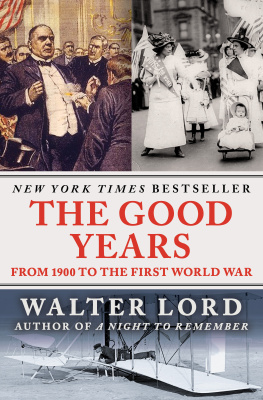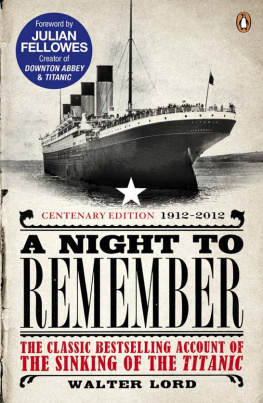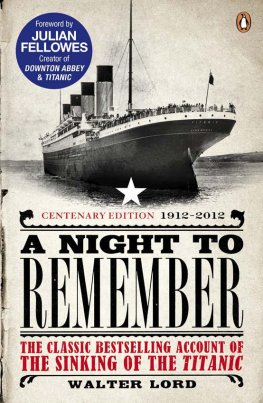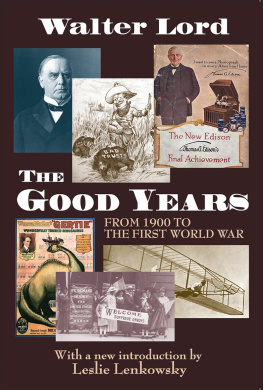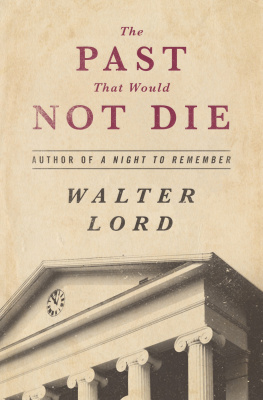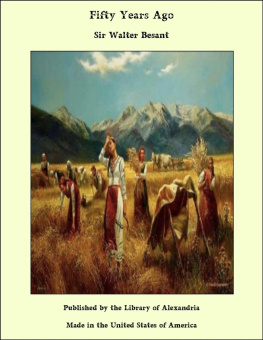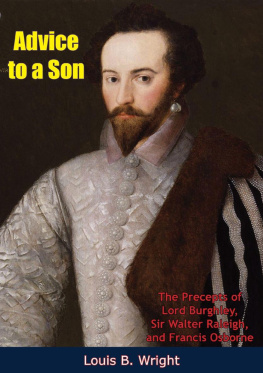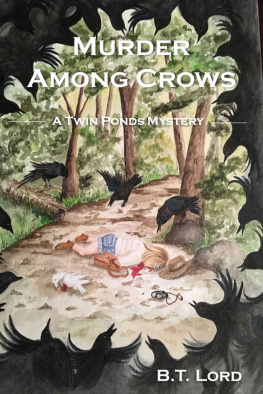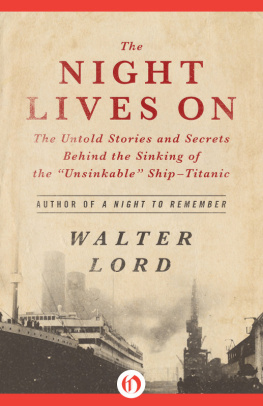Walter Lord - The Good Years
Here you can read online Walter Lord - The Good Years full text of the book (entire story) in english for free. Download pdf and epub, get meaning, cover and reviews about this ebook. genre: Detective and thriller. Description of the work, (preface) as well as reviews are available. Best literature library LitArk.com created for fans of good reading and offers a wide selection of genres:
Romance novel
Science fiction
Adventure
Detective
Science
History
Home and family
Prose
Art
Politics
Computer
Non-fiction
Religion
Business
Children
Humor
Choose a favorite category and find really read worthwhile books. Enjoy immersion in the world of imagination, feel the emotions of the characters or learn something new for yourself, make an fascinating discovery.
- Book:The Good Years
- Author:
- Genre:
- Rating:4 / 5
- Favourites:Add to favourites
- Your mark:
- 80
- 1
- 2
- 3
- 4
- 5
The Good Years: summary, description and annotation
We offer to read an annotation, description, summary or preface (depends on what the author of the book "The Good Years" wrote himself). If you haven't found the necessary information about the book — write in the comments, we will try to find it.
The Good Years — read online for free the complete book (whole text) full work
Below is the text of the book, divided by pages. System saving the place of the last page read, allows you to conveniently read the book "The Good Years" online for free, without having to search again every time where you left off. Put a bookmark, and you can go to the page where you finished reading at any time.
Font size:
Interval:
Bookmark:


For
MARGIE HORNBLOWER
GOOD, NOT BECAUSE RICH men rode in private railroad cars and Society gave magnificent parties. Most people rarely traveled, and many went to no parties at all.
Good, not just because the world was at peace. Millions of so-called little brown brothers took violent exception to Americas fumbling (if well-intentioned) imperialism.
Good, not even because a shirt cost only 23 cents. The child who often made the shirt got only $3.54 a week.
These years were good because, whatever the trouble, people were sure they could fix it. The solutions differed of courseTheodore Roosevelt had his Square Deal, Carry Nation her hatchetbut everyone at least had a bold plan and could hardly wait to try it.
In this sense, the period could be called the Confident Years, the Buoyant Years, the Spirited Years or perhaps named after some bright, hopeful color, like the Golden Years.
It could be done, but such tags are the invention of pundits, social historians, and professional name coiners. To the many varied people who lived through the erathe men and women who wistfully recall marching for suffrage, rebuilding San Francisco, or cheering wildly for Woodrow Wilsonthese were, and still are, the Good Years.
There is not a man here who does not feel 400 per cent bigger in 1900 than he did in 1896, bigger intellectually, bigger hopefully, bigger patriotically, bigger in the breast from the fact that he is a citizen of a country that has become a world power for peace, for civilization and for the expansion of its industries and the products of its labor!
SENATOR CHAUNCEY DEPEW
A FINE, DRY SNOW powdered the sidewalk as William J. Witt and Anna Waddilove, two young German-Americans, entered Liederkranz Hall in Jersey City and stood before the Reverend Rufus Johnson of Trinity Baptist Church. Dr. Johnson eyed his watch for a few moments, then began reading, and pronounced the Witts man and wife at 12:01 A.M., January 1, 1900. The time was important, for the Witts wanted to be the first couple married in the twentieth century.
They were a year too soon. Actually the new century would not begin until 1901. As the newspapers patiently explained, the first century obviously ended with the year 100, so the nineteenth had to end with the year 1900.
Still the Witts werent convinced, nor were many other sentimental German-Americans. After all, the Kaiser himself said this was the day, and in Berlin at this very minute thirty-three guns were saluting the new era. Addressing his officers, Wilhelm promised the rebirth of my Navy, so that in the coming century Germany might win the place which it has not yet attained.
Elsewhere, mathematics prevailed, and the big celebration was postponed for another year. Except for the Witts, Jersey City had an uneventful New Years Eve. The Metropolitan Wheelmen of Boston bicycled quietly to Newburyport. In St. Louis Mr. and Mrs. Thomas Lawler held a candy pull. In New York financier J. Pierpont Morgan played solitaire in his library. Downtown some merrymakers roamed Wall Street, drowning the Trinity chimes with fishhorns, but most people were satisfied with less. At the 28th District Republican Club, the members sipped hot punch while President Charlie Hecht rendered When the Swallows Homeward Fly.
Yet the idea would not die that there was something special about moving into 1900. That irrepressible brigade who write letters to the London Times fired salvo after salvo, arguing that this was indeed the turn of the century. If, explained the Reverend Grimley, Rector of Norton, a bride in her hundredth year were to pass from the altar of my church to the vestry, she would give as her age to be entered in the register 99. Her hundredth year would be labeled 99 until its very close.
In New Orleans, a city endowed with a keen sense of romance, people also felt that 1900 marked a fresh start. A boisterous crowd swarmed along Canal Street, gaily saluting an open carriage of girls at the corner of St. Charles. The girls opened up on them with Roman candles. If this wasnt launching a new century, the police shuddered to think what next year would be like.
The New York Tribune sensed it too. No new century began yesterday. Avoid all delusions on that head, intoned the editor, but those who had to date anything found that there was a queer sensation in writing 1900, and they felt that something momentous had happened to the calendar.
So in the end the Kaiser, with his flair for the dramatic, was right. A new century is something thats not measured but felt. And nearly everybody felt that New Years 1900 was a milestonea time to relish past accomplishments, a time to thrill to the promise of the future.
The newspapers did plenty of both. The New York Times on December 31, 1899, devoted nearly four editorial columns to a review of the Nineteenth Century. It proudly paraded the list of inventionssteam engines, railroads, telegraph, ocean liners, telephones, electric lights, even the cash register. They would pave the way for even greater advances. We step upon the threshold of 1900 which leads to the new century, concluded the editorial, facing a still brighter dawn of civilization.
Sunday sermons struck the same note. The Reverend Newell Dwight Hillis could scarcely contain himself: Laws are becoming more just, rulers humane; music is becoming sweeter and books wiser; homes are happier, and the individual heart becoming at once more just and more gentle.
No wonder hopes were high. From coast to coast, the country had never seen such good times. The Portland Oregonian called 1899 the most prosperous year Oregon has ever known. The Cheyenne Sun-Leader agreed: Never has a year been ushered in with more promise. The Louisville Courier-Journal: Business in Louisville was never better, if as good. The Boston Herald perhaps summed it up best with an interesting thought: If one could not have made money this past year, his case is hopeless.
For a man with a little talent, there seemed no limit. Andrew Carnegie, the gnomelike Scotch steelmaster, saw his annual profits double. Coal operators had the best anthracite year in history. The slump of 1893-95 was all but forgottensince those dreary days Southern cotton goods were up 92 per cent, manufactured exports 88 per cent, glass output 52 per cent. No one noticed that the glass production record was achieved with the help of a ten-year-old child who had to tie stoppers on three hundred dozen bottles a day.
Even the usually discontented farmers were happy. Kansas barns bulged with a bumper corn crop. The cities and towns of the Midwest enjoyed a fantastic Christmas season. A Minneapolis jeweler figured that on one day during the holiday rush his diamond sales ran at the rate of $2,400 an hour.
Sales were high, but prices were lowjust the way the system was meant to work. A Chicago couple furnishing a home could easily get a mahogany parlor table for $3.95 a sofa for $9.98 a brass-trimmed bed for $3. Food wasnt much of a problem with corned beef selling at 8 cents a pound. Clothes were equally reasonablein Denver turtleneck sweaters were eight cents apiece, felt hats 89 cents, top-quality suits $10.65. Wages might be modest by later standards, but a man from Birmingham, Alabama, could still celebrate New Years respectably, when six-year-old whiskey cost $3.20for four quarts.
Next pageFont size:
Interval:
Bookmark:
Similar books «The Good Years»
Look at similar books to The Good Years. We have selected literature similar in name and meaning in the hope of providing readers with more options to find new, interesting, not yet read works.
Discussion, reviews of the book The Good Years and just readers' own opinions. Leave your comments, write what you think about the work, its meaning or the main characters. Specify what exactly you liked and what you didn't like, and why you think so.

